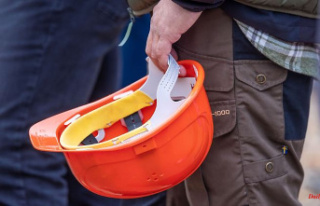A particularly large number of refugees are currently coming to Germany in search of a safe place to live. The municipalities have to organize their accommodation, but many are at the limit. In "Hart aber fair", Jens Spahn calls for even stronger security of the external borders, but that is unlikely to solve the problem.
Tanja Schweiger had an idea. And that was last summer. The city of Regensburg then turned to the district administrator with a question: your anchor center for refugees had reached the limit of its capacity. Did she have a suggestion as to what to do? Tanja Schweiger had. She rented a ship with all the trimmings: cabins, kitchen, crew. The ship anchored in the Danube. Today 130 people live on the ship, there would be room for 200.
Schweiger is one of the guests on "Hart aber fair" on ARD, the show is about a problem that the federal government seemed to have missed for a long time: the new refugee crisis. The problem now seems to have been recognized, but there is still no solution. A refugee summit convened by Federal Interior Minister Nancy Faeser ended a good two weeks ago in a dispute - and with the formation of several working groups. And now the minister wants to make the municipalities even more responsible. In the Monday edition of the Stuttgarter Zeitungen, she called on the communities to keep shelters in reserve for emergencies.
About 1.2 million people fled to Germany last year, mostly Ukrainians. The federal states and municipalities are responsible for their accommodation and care. The federal government wants to support them this year with 2.75 billion euros. According to Faeser's most recent statements, one can wait and see when the call for further federal aid will come.
CDU politician Jens Spahn is preparing the ground for this. "Everywhere we are at the limit of what we can achieve," he says at "Hart aber fair". And Tanja Schweiger from the Free Voters adds: "Things can't go on the way they are now."
Britta Haßelmann from the Greens initially tries to appease. After all, there are also municipalities that are coping very well with the situation. In their home town of Bielefeld, for example, refugees were given buildings that had previously been used by the British army. Later in the program she will explain that the federal government has recognized the problems, and at the end she will answer the question of the Regensburg district administrator when the government will finally act.
Jens Spahn would also like to know that. He says that in January alone, 30,000 people applied for asylum in Germany. Extrapolated for the whole year, that's 360,000. Last year there were 120,000 fewer asylum applications. "Overwhelm prevents integration," says Spahn. If integration is to succeed, sufficient time and resources must be available. But: "We are not sufficiently prepared for the number of refugees." Money alone will not solve the problems. Instead, it was said during the last refugee crisis in 2015 that the EU's loss of control at its external borders should not be repeated. "The solution lies in the fact that we, as the EU, have to give the signal that we cannot solve all problems by everyone making their way to the EU. As difficult as that is. And it is also not possible for most of them Make people go to Germany when they arrive in the EU."
With this opinion, Spahn is pretty much alone on the show. The other guests rightly point out that most of the refugees who entered Germany last year fled the war in Ukraine. “We also fully support that,” concedes Spahn. Nevertheless, he says: "We will reach our performance limit." And refugees do not have the right to choose their destination country after they have fled. The Geneva Refugee Convention does not provide for this.
"I see us as responsible for municipal aid," says Britta Haßelmann, leader of the Greens parliamentary group. Even if not all municipalities are at the limit, they must still be able to provide the most important services for refugees. These are language courses, education, integration and housing. You have to talk to the local authorities. "But the assertion that nothing happened is also wrong," emphasizes Hasselmann. The federal government has accelerated the asylum procedure and changed the perspectives of many people. Negotiations are currently underway on the common European asylum system issue. "As far as the problems of the municipalities are concerned: I assume that at the Prime Ministers' Conference in early April they will also be discussed very specifically. I assume that we will then also agree very clearly what will happen. The other processes will start."












